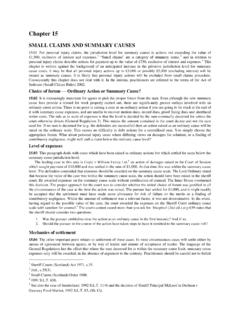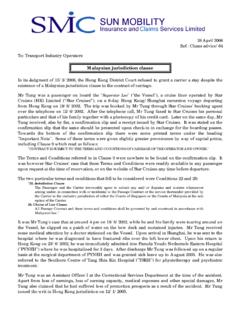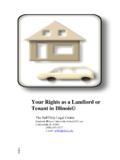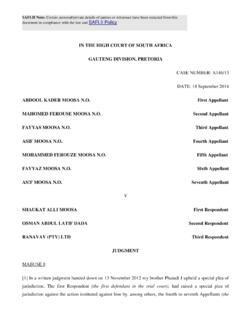Transcription of THE LOUISIANA FAMILY LAW BENCH BOOK …
1 DRAFT ONLY (8/2/13): PLEASE DO NOT CIRCULATE OR CITE WITHOUT CONTACTING THE AUTHOR. 1 THE LOUISIANA FAMILY LAW BENCH book Andrea B. Carroll CHAPTER 4: DIVORCE I. Overview A. Grounds for divorce [La. Civ. Codearts. 101, 102, 103; La. Rev. Stat. 9:307 et seq.] Marriage terminates divorce. La. Civ. Code art. 101. The grounds for divorce, however, are different for traditional and covenant marriages. Today, both types of marriage include both fault and no-fault grounds for divorce. In traditional marriage, no fault divorce is provided for under La. Civ. Code arts. 102 & 103(1), allowing divorce upon a showing that the parties lived separately for the requisite period of time. These articles provide two methods for no-fault divorce in traditional marriage, commonly referred to as 102 divorce and 103 divorce.
2 The only fault-based grounds for divorce, under a traditional marriage are adultery and commission of a felony under La. Civ. Code art. 103(2) and 103(3). Divorces granted on these fault grounds are immediate and do not require a waiting period. Divorces in covenant marriages are not governed by these provisions, but by an entirely separate set of rules, La. Rev. Stat. 9:307 et seq. Covenant marriage revives the old fault-based grounds for legal separation, which were suppressed in 1991 for couples in a traditional marriage. Although the intention of covenant marriage was to provide a legal regime under which divorce is more difficult to obtain, a provision for no-fault divorce exists under these laws as well. Nevertheless, the no-fault divorce is more restrictive under covenant marriage than it is under traditional marriage.
3 B. Jurisdiction [La. Code Civ. Proc. art. 10] A court which is otherwise competent under the laws of this state has jurisdiction an action of divorce, if, at the time of filing, one or both of the spouses are domiciled in this state. La. Code Civ. Proc. art. 10(A)(7). There is a rebuttable presumption of domicile in LOUISIANA if a spouse establishes and maintains a residence in a parish of this state for a period of six months. La. Code Civ. Proc. art. 10(B). C. Venue [La. Code Civ. Proc. art. 3941] Venue in divorce suits is of critical importance, because a divorce judgment rendered by a court of improper venue is an absolute nullity. La. Code Civ. Proc. art. 3941(B). This venue cannot be waived and is jurisdictional. Venue is proper in a court in: DRAFT ONLY (8/2/13): PLEASE DO NOT CIRCULATE OR CITE WITHOUT CONTACTING THE AUTHOR.
4 2 A parish where either party is domiciled, or The parish of the last matrimonial domicile. La. Code Civ. Proc. art. 3941(A). II. 102 Divorce [La. Civ. Code art. 102] A. Generally Under La. Civ. Code article 102, spouses can obtain a no-fault divorce by living separate and apart for a particular period of time either 6 months or a year after the filing of a petition for divorce. Introduced to LOUISIANA law in 1990, this method of divorce is distinctive, because it allows a spouse to file a divorce petition before living separate and apart. Such a possibility does not exist in most states and is relatively new even in LOUISIANA . The spouses can begin living separate and apart at any point after (or before) filing the petition, provided they eventually meet the statutory minimum period.
5 The 102 divorce is the most frequently used divorce ground in LOUISIANA for a number of reasons. For one, it may provide for the fastest divorce possible under LOUISIANA law. Although the fault-based divorces are in theory immediate, because they occur by ordinary proceeding, they are not at all immediate in practice. The 102 divorce action, by contrast, is a summary proceeding, generally progressing more quickly. Parties may also choose 102 divorce because of its effect on the community property regime. Because termination of the community is retroactive to the date of filing the divorce petition, the 102 divorce allows for termination earlier on in the divorce proceeding, which generally benefits the spouse with a higher income because all subsequently acquired assets are separate rather than community property.
6 A 102 divorce may even be preferable to the less economically powerful spouse, because incidental relief is available sooner then it is when a party pursues a no-fault 103 divorce. While spousal support, child support, and custody are available during marriage under La. Rev. Stat. 9:291 if the couple is living separate and apart, injunctive relief, use and occupancy of the FAMILY home, and use of community movable, immovable, or personal property are only available once a petition for divorce has been filed. La. Civ. Code art. 105. Because the divorce petition begins the process of a 102 divorce, the possibility of this additional relief is available sooner than under a 103 divorce, wherein a petition for divorce is not filed until closer to the end of the process.
7 B. The Petition The 102 divorce commences with a divorce petition. However, because this is not an ordinary proceeding, the petition s primary function is to mark the beginning of the time period of living separate and apart. DRAFT ONLY (8/2/13): PLEASE DO NOT CIRCULATE OR CITE WITHOUT CONTACTING THE AUTHOR. 3 1. Contents. The petition need not allege marital breakdown, fault on the part of the other spouse, living separate and apart from the other spouse, or any other basis. La. Civ. Codeart. 102, comment (b). It is sufficient if the petition contains: Declaration of plaintiff s desire to be divorced; Statement of jurisdiction, see, supra, jurisdiction; Statement of venue, see, supra, venue. Additionally, the specific allegations of jurisdiction and venue, contained in the petition, must be verified by affidavit of the plaintiff.
8 La. Code Civ. Proc. art. 3951. Since no answer is required in 102 divorce, these extra procedural safeguards are necessary to protect the defendant. Judicial Tip: A sample 102 divorce petition is provided at Form No. (verification at From No. ). Check to be sure the divorce petition contains each of the necessary elements. 2. Service. Plaintiff has 90 days from filing to either request service on defendant or request the appointment of a curator for an absentee defendant. La. Code Civ. Proc. art. 3955. Defendant may waive the service requirement by any written waiver. Additionally, defendant s failure to file a declinatory exception of insufficiency of service of process alleging failure to timely request service results in waiver of the service requirement.
9 La. Code Civ. Proc. art. 3955. If petitioner receives a waiver, it should be filed with the petition. The written waiver must be executed after filing of the petition and made part of the record. La. Code Civ. Proc. art 3957. Judicial Tip: See Form No. for the waiver of service and citation you will need to have on file in the absence of service on the plaintiff. Judicial Tip: If service is not timely requested, and a waiver is not obtained, defendant should file a declinatory exception akin to that at Form Generally service may be perfected in one of two ways personal or domiciliary. Personal service is the only option if the spouses are still residing in the same place at the time the petition is filed. La. Code Civ. Proc. art. 3956 (2)(b). If, however, the spouses are already living separate and apart, domiciliary service is sufficient.
10 La. Code Civ. Proc. 3956. Specific service provisions for 102 divorce petitions are provided in La. Rev. Stat. 13:3491. In addition to service of the petition, La. Rev. Stat. 13:3491 requires service of notice to accompany the petition. The notice, which is signed by the clerk of court, is designed to explain to the lay recipient what will happen next. La. Rev. Stat. 13:3491 states that notice shall be sent with the petition. When this requirement was first passed in 1990, many 102 divorces were still filed without these notices. Problems with noncompliance with this provision, along with the lack of clarity as to what sanction results from failure to send notice led to the enactment of 13:3493 in 1995, which states that notice should be sent, but that if it is not, nullity does not result.







